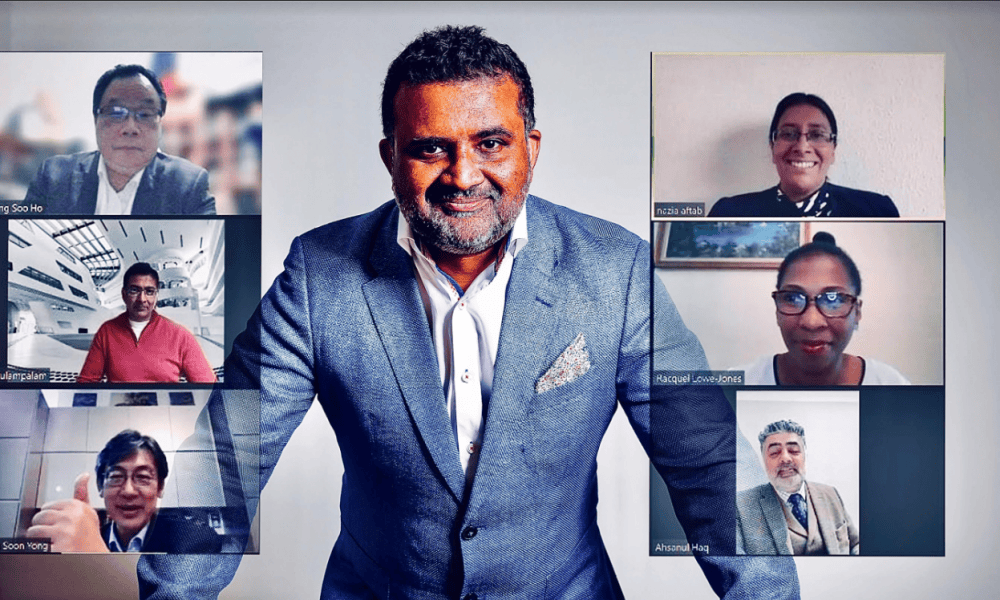
Dr Ramdas Senasi (who insists on being called Ram) has always had a mind for change. As a child, the paediatric radiologist, human ethernet and healthcare influencer ran his own unofficial McDonald’s venture, supplying his well-off fellow students at an international boarding school in his native Malaysia a much-demanded product.
“I have always been comfortable in challenging norms. I guess the McDonald’s business was the start of me doing things differently,” Ram tells Health Tech World.
“I remember the principal having to eventually shut it down as I disrupted the weekend catering at school. Fortunately, I was able to restart it under the auspice of the Cookery Club to raise funds when I was nominated as President. It was never about personal gain,” he laughs.
“My boarding school Kolej Tuanku Ja’afar was a good start for me because I was with kids from all over the world.”
Ram launched Imperial Medical Solutions (IMS) in 2020 alongside co-founders Mr Ahsanul Haq, Prof Tan Arulampalam and Mrs Nazia Aftab. The company helps British med-tech companies deliver technology and expertise worldwide, in particular to developing nations.
Last year, IMS worked with the Department for International Trade (DIT) and Freehand 2010 Ltd to send their robotic systems to Jamaica, Trinidad and Tobago and Malaysia, and this year, to India.
The robots are used in keyhole procedures, providing surgeons with rock steady images and removing the need for camera-holding assistants to attend operations.
This was very much their flagship project, and with good reason.
“Who doesn’t like talking about robots?” He laughs.
“We needed something to go with a bang. So we started with robots and opportunities opened up.”
“The beauty of this robot is that it’s about 15 times cheaper than the more talked-about surgical robots. And you can quickly set it up, which frees up an experienced nurse or doctor who would be better off holding the hands of a patient.
“You don’t always need an airplane, sometimes a helicopter will do the job.”
IMS’s work with their various partners including Freehand has now been included into The Great Campaign, run by the UK government.
Less than two years old, IMS is already leaving its mark on the MedTech landscape, with rapid expansion, forming an Asian entity called AG IMS Asia, led by Mr Yong Chong Soon and very soon, an Indian entity which will be led by Dr Natesh Bala.
They also have a strategic partnership with the well-established AA Laquis Group in the Caribbean helping to expand IMS’s footprint further.
“To us, it is all about networking and human relationships. Call it old fashioned but the tech world needs a bit of old fashioned handshakes sometimes,” says Ram.
Just as important as the technology is the ability to get it into the hands of those who need it. IMS knows how to communicate with people on the ground who can influence change, Ram says.
Getting Freehand robots into the Caribbean, Malaysia and India was testament to this.
“With India for example, we made a call to our contacts and secured the Deputy British High Commission facility to host the workshops and the dinners afterwards.
“Through our network, the Tamilnadu Health Minister was also invited to inaugurate the event. This was all done in six weeks. That’s why you want IMS on your side. We just get things done!”
Ram stresses the importance of education in ensuring that cutting-edge technology is used correctly.
He cites his own experience in volunteering in Laos in 2015. The hospital had been sent state-of-the-art technology from Korea and China that sat gathering dust for years because no one knew how to operate it properly.
Telemedicine is now helping to educate surgeons, democratisating tech and education.
“Until Covid, if you wanted to train doctors to use equipment, you would fly them out there. But that meant that big companies wouldn’t want to invest in a small country as the cost was prohibitive.
“I still remember speaking to the distributors and the surgeons in the Caribbean and saying: ‘Don’t worry, I know the robots are en route and we don’t have a training solution yet but we’ll find it and get the job done.’
“It felt like a scene from Apollo 13 but IMS kept our word!
“In two weeks, our partners Digital Resilience UK, led by Hamish McKenzie, had helped create the world’s first remote robotic surgery training solution using easy-to-access technology.”
Initiatives such as these can benefit the UK, too.
“In the future, NHS doctors can do the bulk of their training remotely,” Ram says. “So instead of 10 doctors teaching 100 people how to do a procedure, one doctor can easily do the job.”
IMS is now introducing innovative telemedicine technology with their growing list of like-minded partners, Healia and Mitrosys, which Ram hopes will become the de facto solution for the Caribbean and in other emerging economies.
The system also uses AI-enabled facial recognition to read the user’s pulse, heart rate, blood pressure, stress levels and temperature, and very soon patient reward mechanisms to support good health behaviour.
It will also aim to integrate rapid PCR technology for Covid and disease testing, using one of their early partners, Liberty-Labz, led by ex-military, Chemical, Biological, Radiological and Nuclear (CBRN) Specialist, Col (R) James Milnes.
“This is where telemedicine should be going,” Ram says.
But Ram stresses that technology is not a healthcare panacea. You need to understand both the needs of the client and their current level of comprehension.
With that in mind, IMS is developing what it calls a ‘Four Corners’ approach to problem solving. Ram is a bit secretive about it but promises it will be game-changing.
“We have two experts, Prof Ken Catchpole and Mr Lee Walker currently working on perfecting this. Lee is best known for his work with the UK’s Covid Genomic Sequence effort and Ken for his work integrating Ferrari F1 pit crew strategy into complex paediatric congenital heart surgery team-building.
“Fortunately, IMS are blessed with world-leading experts and the list is growing!”
“When we go into an ecosystem, we’ll be asking: Where are you in terms of your knowledge and experience? How do we support training using the leanest strategy possible? Is there a role for technology to help you solve your problems? How do we have a human-centred approach?”
IMS is now working to strengthen links between UK companies and recognised universities in Malaysia.
The company has a memorandum of understanding with the International Medical University in Malaysia to support the Data Analytics and Health informatics department. They are also in early stages of talks with Cyberjaya University, to help digitise their education platform and take it into the next generation.
“Both these opportunities will lead to joint R&D. This is a very easy pathway for UK companies to have a soft landing into a recognised institution, so that when they launch, they do so with local data and endorsement.”
The end game, Ram says, is to make sure healthcare access is fair. Achieving that requires as much understanding of people and relationships as technology.
“Look at artificial intelligence (AI). AI is great, because it generates so many opportunities in improving care. We know it’s good, but why aren’t people adopting it as fast as we want?
“Because people are scared. No one’s actually sat down and asked, okay, why are you scared? And how can I connect with you on a human level to alleviate your concerns? Because ultimately, we all want what’s best for patients.
“If you want what’s best for the passengers in your car, you will have ABS and auto-breaking. By the same token, if you want what’s best for your patients, you will want to run AI in the background.
“This not only applies to AI, biosecurity, telemedicine and robotics but all the other exciting technology out there. We need to have these conversations so we can make that great leap to democratising healthcare.
“Ultimately at IMS, we bring humanity back to technology.”









